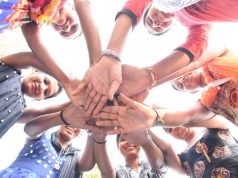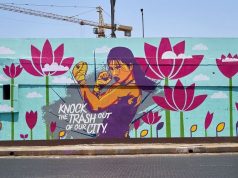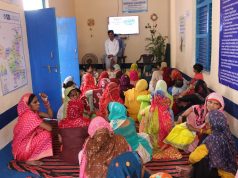Home
CATEGORIES
Health & Sanitation CSR: ABGUS and HUL set up treatment pond to recycle 40,000 litres...
CSR: ABGUS and HUL set up treatment pond to recycle 40,000 litres of waste water per day
The Akhil Bhartiya Gramin Uthan Samiti (ABGUS) is a voluntary civil society organization working in various areas of social welfare. ABGUS, with CSR support of Hindustan Unilever Limited (HUL) has inaugurated a Water Management Project in village Dhingi of block Nabha in district Patiala, Punjab.
This wastewater management project was aimed to recycle the wastewater and reuse it for irrigation & groundwater recharge along with rainwater harvesting. By analyzing the need and importance of sustainable water management, ABGUS has been continuously working in the fields of water conservation and water management.
The pond of Dhingi the village, that was being used for domestic wastewater falling in it through the village drains are about one acre in size. Keeping the two main objectives of the project, first “recycling & reusing the treated wastewater for irrigation” and second “preventing further contamination of groundwater”, the Seechewal Model of wastewater management was proposed by the organization ABGUS.
The project was planned to implement a combination of various processes through four-well systems of wastewater treatment for reuse other than human consumption, such as irrigation and gardening. Introduced by Baba Balbir Singh Seechewal, it is a primary treatment used in Seechewal, Punjab which removes heavy solid particles, oil separation, and remaining material from water. The water wells need to be cleaned regularly; otherwise, they produce very poor effluents with high suspended solids content, which can be detrimental to the constructed wetland and cause clogging of beds. To ensure continuous effective operation, the accumulative material therefore must be emptied periodically.
On the successful completion of the project, Rajesh Verma, Chief Functionary & Secretary; Akhil Bhartiya Gramin Uthan Samiti said, “Benefiting around 350 households and a total of 2,755 people, the project will reduce the usage of freshwater by providing an option of treated water to farmers aiming at water sustainability with appropriate technologies of Water Recycle-Reuse-Recharge.”
He also said that the CSR project has engaged, empowered, and evolved community sustained processes for water management and the strengthened community collectives. The capacitated Community Based Organization for watershed management will jointly work with secondary & territory stakeholders for Water Sustainability in the village.
Disclaimer: This media release is auto-generated. The CSR Journal is not responsible for the content












